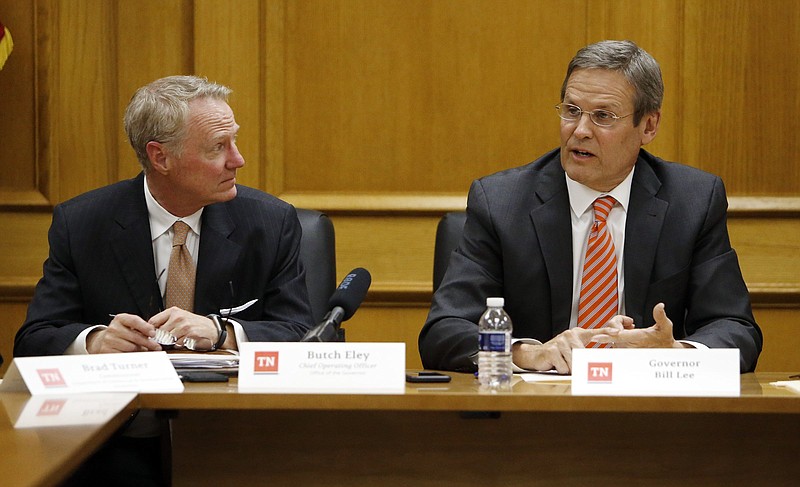NASHVILLE - Gov. Bill Lee's administration has put forth plans to use a half billion dollars in new federal COVID-19 stimulus funds to expand Tennessee's broadband internet access in unserved or underserved areas while also providing subsidies to some low-income families.
The announcement came Wednesday during a meeting of Lee's Financial Stimulus Accountability Group as the governor, top administration officials, legislative leaders and Comptroller Jason Mumpower discussed plans for using the $3.72 billion that state government will see under President Joe Biden's American Rescue Plan, signed into law back in March.
Lee, who has the support of fellow Republicans who control the General Assembly, said the spending includes $1.35 billion for sewer and water projects across the state.
Tennessee counties, cities and towns, meanwhile, are expected to reap an additional $2.88 billion as part of their share of the $1.9 trillion federal act that was opposed by congressional Republicans.
Although the state has no real control over how local governments spend the money - federal rules govern that just as the rules do for states - group members nonetheless spent considerable time stressing their preference that local governments make prudent investments, that locals cooperate with them.
Comptroller Mumpower said he has visited 60 of Tennessee's 95 counties so far in an effort to caution local government leaders to be careful in their spending and be ready to account to Uncle Sam that it was used for approved purposes.
With regard to the $500 million for broadband, Lee's policy director, Tony Niknejad, said $400 million would go toward grants to providers to extend service in areas that qualify as unserved, many of them in rural parts of the state.
Officials say initial applications by internet providers to obtain grants start this fall with initial grant distribution beginning in spring 2022. Another round of applications comes next summer with awards sent out in the winter of 2023.
Niknejad and other officials said they are working on a new map of current broadband coverage, believing federal data includes very low-speed connections and the spending bill allows states to subsidize installation of much faster fiber.
The remaining $100 million in federal funds would go toward subsidies for low-income families over a four-year period.
In this year's budget, Lee and lawmakers also put in $100 million in state funds for broadband expansion. Finance Commissioner Butch Eley said the state intends to keep that in reserve.
Eley said state officials have "talked a lot" with local officials "about how this coordination wants to take place. They're ultimately responsible for their dollars. We will not be assuming risks for the local governments."
State Environment and Conservation Commissioner David Salyers, whose department awards state water and sewer infrastructure grants, stressed the impact of the infrastructure investment.
"It's hard to underscore just how important an investment this is," Salyers told Lee and others, including Senate Finance Committee Chair Bo Watson, R-Hixson, and House Finance Chair Patsy Hazlewood, R-Signal Mountain. "There's not a community from Mountain City to Memphis that cannot use improvement in their water and sewer system."
Some of the investments are "fundamentally important to the health and well being of people in communities across the state. Some are fundamentally important for economic development efforts," Salyers said, later adding, "this is [a] ground-level role of government and very much appreciated and desired by local governments."
Responding to questions posed by Hazlewood about how the money coming to local governments flows to utility districts, Niknejad said "coordination is going to be our biggest challenge," adding it will involve "three-part coordination between state, local government and potentially multiple utility providers."
Mumpower said it will take approval by county commissioners and city council members across the state "that they want to use part of their federally designated dollars for the purpose of improving utilities in their community."
"That's not the only priority out there, I mean, some have other things they want to do with the money," Mumpower added. "But it is going to take a decision by local governing bodies that they want to invest in utilities." He said he has "encouraged" officials with utilities to speak with elected leaders, noting, "it's to take a decision by local governing bodies."
Contact Andy Sher at asher@timesfreepress.com or 615-255-0550. Follow him on Twitter @AndySher1.
